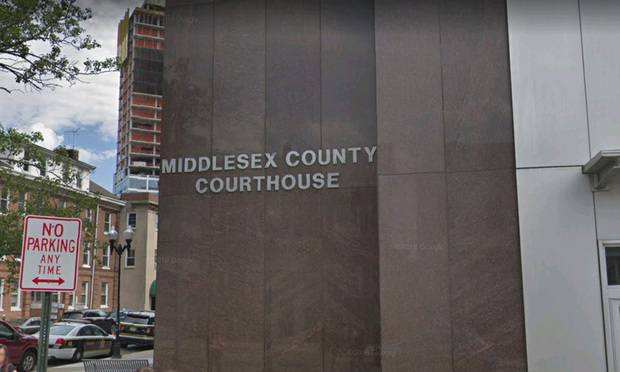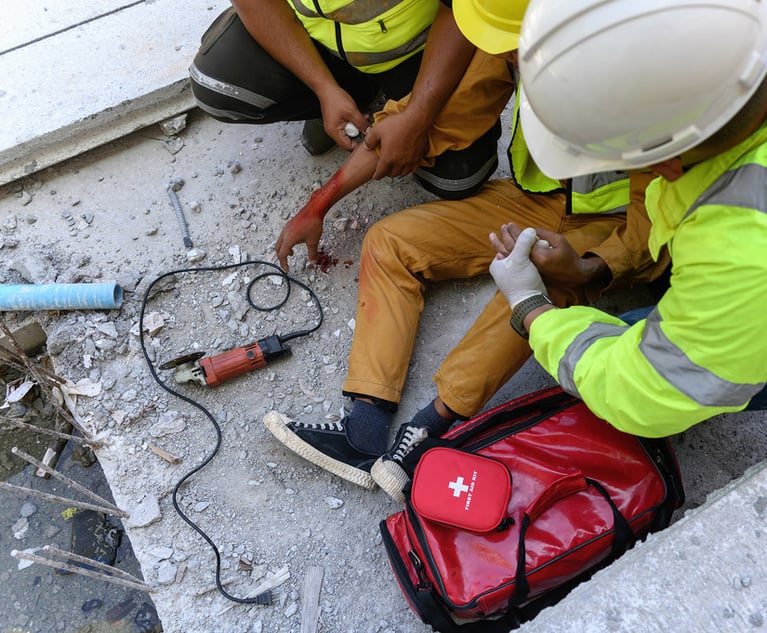NJ Judge Draws Fire After Sealing Verdict in Personal Injury Suit
The court's action is "entirely unheard of and extraordinary," Mark Morris of Clark Law Firm wrote in the letter, which urged the judge to deny the request.
November 19, 2019 at 03:45 PM
4 minute read
 Middlesex County Superior Court in New Brunswick/courtesy photo
Middlesex County Superior Court in New Brunswick/courtesy photo
A judge is drawing criticism in Middlesex County Superior Court for placing a personal injury verdict under seal right after the jury rendered it.
Judge Thomas Buck issued the order Nov. 8 after conducting a four-week trial in Silva v. Jacobs, which was brought by a worker who was injured in a construction accident. Counsel for defendant Jacobs Engineering Group sought to have the verdict kept under wraps after it was announced in open court, said Mark Morris, a lawyer for plaintiff Joao Silva, in a letter sent to Buck on Monday.
Jacobs Engineering's lawyer, Timothy Saia of Morgan Melhuish Abrutyn in Livingston, sought to have the verdict deemed confidential after finding out the jury returned a plaintiff's verdict, Morris wrote in the letter. The court's action is "entirely unheard of and extraordinary," Morris wrote in the letter, which urged the judge to deny the request.
The case's connection to a $17 million, publicly funded New Jersey Turnpike bridge construction project is a further reason to keep the verdict public, said Morris, who is with Gerald Clark's office in Belmar. The complaint in the case said Silva, a union laborer for defendant Contico Corp., was severely injured when he was struck by a construction vehicle in Secaucus on Dec. 10, 2013.
"Failing to manage safety on a Turnpike job like this jury found places the public at risk. Jacobs' request to hide the truth is abhorrent to the public interest, our court rules, and case law," Morris wrote to the judge.
"Jacobs was expecting a no cause verdict and it was not until after they lost [that] they tried to get it sealed," Morris said in his letter to Buck. "Jury verdicts are a public record and comprehensive research has not revealed a single instance where a civil injury jury verdict was sealed," he said.
The complaint, filed in 2015, named multiple defendants, but Jacobs was the only defendant remaining when the case went to trial. The plaintiffs maintained that Jacobs was negligent for failing to maintain safe conditions at the work site.
A party seeking to seal a record must demonstrate that disclosure will likely cause "a clearly defined and serious injury to any person or entity," and the interest of that person or entity in privacy "substantially outweighs the presumption that all court and administrative records are open for public inspection," Morris' letter stated. But no motion was filed by Saia, and nothing to support the burden was set forth under court rules, but simply a request to seal the verdict after counsel for Jacobs Engineering found out they lost, Morris said in the letter.
Morris said in his letter to the judge that both sides placed terms of a high-low agreement on the record Nov. 6, and at that time Saia did not indicate a desire to make the verdict confidential. But the next day, after the jury found his client 100% at fault, they sought to keep the verdict under wraps, Clark said.
A note on the case Tuesday in the judiciary's online case management system says that "Until the conclusion of this matter, any mention of the verdict amount shall not be exposed via e-Courts. Contact Chamber [sic] with any questions or concerns."
The order issued by Buck says the verdict sheet would be filed under seal pursuant to terms of a high-low agreement between the parties.
A person who answered the phone at Buck's chambers on Tuesday referred a reporter to the judiciary's communications department.
Saia did not respond to requests for comment about the case. Nor did Morris. The judiciary's communications department had no comment.
Clark said he hoped the judge would rectify the error.
"I think this is just Jacobs pushing for something that's not provided under the rules," Clark said.
This content has been archived. It is available through our partners, LexisNexis® and Bloomberg Law.
To view this content, please continue to their sites.
Not a Lexis Subscriber?
Subscribe Now
Not a Bloomberg Law Subscriber?
Subscribe Now
NOT FOR REPRINT
© 2025 ALM Global, LLC, All Rights Reserved. Request academic re-use from www.copyright.com. All other uses, submit a request to [email protected]. For more information visit Asset & Logo Licensing.
You Might Like
View All

Dispute Resolution Boards—Getting Real Time Decisions on Construction Projects
7 minute read
Insurer Has No Duty to Defend 'Laidlow' Claims, NJ Supreme Court Says
3 minute read
Construction Worker Hit by Falling Concrete Settles Claims for $2.3M
4 minute readLaw Firms Mentioned
Trending Stories
- 1DOT Moves to Roll Back Emissions Rules, Eliminate DEI Programs
- 2No Injury: Despite Proven Claims, Antitrust Suit Fails
- 3Miami-Dade Litigation Over $1.7 Million Brazilian Sugar Deal Faces Turning Point
- 4Trump Ordered by UK Court to Pay Legal Bill Within 28 Days
- 5$19.1M Verdict: 'Most Accurate Settlement Demand I Ever Made'
Who Got The Work
J. Brugh Lower of Gibbons has entered an appearance for industrial equipment supplier Devco Corporation in a pending trademark infringement lawsuit. The suit, accusing the defendant of selling knock-off Graco products, was filed Dec. 18 in New Jersey District Court by Rivkin Radler on behalf of Graco Inc. and Graco Minnesota. The case, assigned to U.S. District Judge Zahid N. Quraishi, is 3:24-cv-11294, Graco Inc. et al v. Devco Corporation.
Who Got The Work
Rebecca Maller-Stein and Kent A. Yalowitz of Arnold & Porter Kaye Scholer have entered their appearances for Hanaco Venture Capital and its executives, Lior Prosor and David Frankel, in a pending securities lawsuit. The action, filed on Dec. 24 in New York Southern District Court by Zell, Aron & Co. on behalf of Goldeneye Advisors, accuses the defendants of negligently and fraudulently managing the plaintiff's $1 million investment. The case, assigned to U.S. District Judge Vernon S. Broderick, is 1:24-cv-09918, Goldeneye Advisors, LLC v. Hanaco Venture Capital, Ltd. et al.
Who Got The Work
Attorneys from A&O Shearman has stepped in as defense counsel for Toronto-Dominion Bank and other defendants in a pending securities class action. The suit, filed Dec. 11 in New York Southern District Court by Bleichmar Fonti & Auld, accuses the defendants of concealing the bank's 'pervasive' deficiencies in regards to its compliance with the Bank Secrecy Act and the quality of its anti-money laundering controls. The case, assigned to U.S. District Judge Arun Subramanian, is 1:24-cv-09445, Gonzalez v. The Toronto-Dominion Bank et al.
Who Got The Work
Crown Castle International, a Pennsylvania company providing shared communications infrastructure, has turned to Luke D. Wolf of Gordon Rees Scully Mansukhani to fend off a pending breach-of-contract lawsuit. The court action, filed Nov. 25 in Michigan Eastern District Court by Hooper Hathaway PC on behalf of The Town Residences LLC, accuses Crown Castle of failing to transfer approximately $30,000 in utility payments from T-Mobile in breach of a roof-top lease and assignment agreement. The case, assigned to U.S. District Judge Susan K. Declercq, is 2:24-cv-13131, The Town Residences LLC v. T-Mobile US, Inc. et al.
Who Got The Work
Wilfred P. Coronato and Daniel M. Schwartz of McCarter & English have stepped in as defense counsel to Electrolux Home Products Inc. in a pending product liability lawsuit. The court action, filed Nov. 26 in New York Eastern District Court by Poulos Lopiccolo PC and Nagel Rice LLP on behalf of David Stern, alleges that the defendant's refrigerators’ drawers and shelving repeatedly break and fall apart within months after purchase. The case, assigned to U.S. District Judge Joan M. Azrack, is 2:24-cv-08204, Stern v. Electrolux Home Products, Inc.
Featured Firms
Law Offices of Gary Martin Hays & Associates, P.C.
(470) 294-1674
Law Offices of Mark E. Salomone
(857) 444-6468
Smith & Hassler
(713) 739-1250






